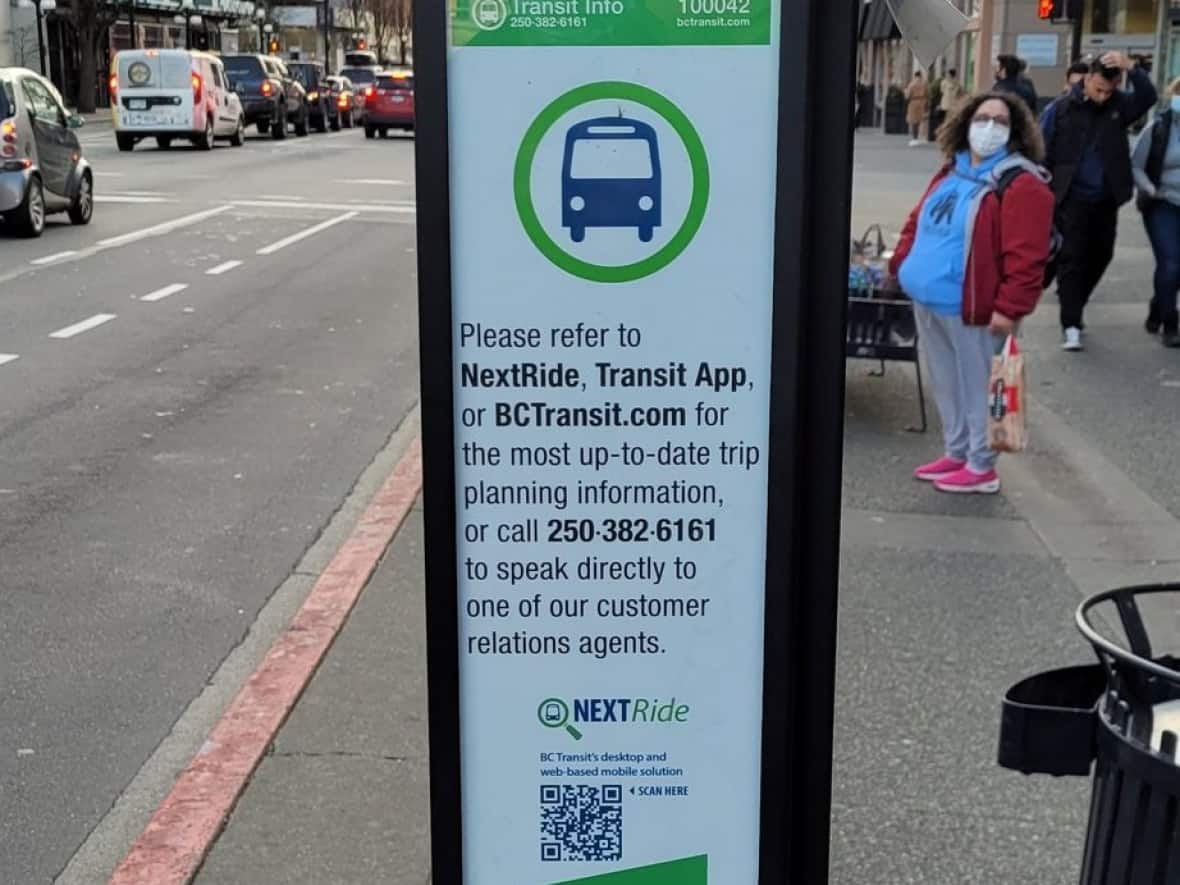B.C. Transit takes 'step backward' on accessibility by removing Victoria bus schedules, say advocates

Bus riders in Victoria are questioning the provincial transit agency's move this week to take down bus schedules from all its stops across the capital region.
Instead, transit users now see signs with a website, a scannable QR code and a phone number to help them find out when the next bus is arriving. B.C. Transit says the move is only temporary, but without an end-date, because of driver shortages.
But for some Victoria residents, the move is a "giant step backwards" — one an accessible transportation researcher said will disproportionately impact seniors, low-income residents and anyone without a cellphone or data plan.
"It seems like a giant step backwards for older adults, who may not typically be used to using a phone to rely on transportation service … and for people who are relying on lower sources of income," said Colby Harder, who researches transportation planning and equity at the University of Victoria's geography department, in an interview Saturday.
Harder, who focuses on seniors' access to transportation, said with cellphone and data prices unaffordable to many Canadians, there should be some alternative provided until B.C. Transit can restore service levels — and hopefully, install digital real-time bus notices at more stops.
"It just adds another layer of complexity for people to be able to access those services," Harder told CBC News. "And it will probably result in them being less mobile."
B.C. Transit spokesperson Lenore Kennedy apologized to riders for the inconvenience and acknowledged the removal of the timetables is frustrating for many.She said the agency removed all printed timetables from bus stops last Monday across the Victoria Regional Transit System, but assured residents the move is only temporary until it can find and hire enough drivers to offer consistent service.
Until then, the labour shortage requires route planners to adjust bus schedules on short notice — making printed timetables unreliable.
"B.C. Transit continues to experience temporary labour shortages and anticipates some service disruptions," Kennedy said in an emailed statement. "This is resulting in the need to, at times, adjust schedules on short notice, and any printed materials would not provide the most accurate, up-to-date information.
"B.C. Transit understands the situation is frustrating and appreciates our customers' patience during this time."

She urged any riders unable to access the QR codes or website provided to phone B.C. Transit's route planning line before setting out for their trips.
But for one community planner in the province's capital, the solution to the staffing problem should not come at the expense of marginalized people.
The transit timetables' replacement with new signage adds barriers for those most dependent on public transportation, said community planner Dan Huang, founder of Connections Planning Associates in Victoria.
"I'm privileged to have access to a mobile phone with data," Huang told CBC News. "And what immediately came to me was for those that don't have that access.
"Creating opportunities for all modes of transportation — that really requires equal access to those services. And providing a schedule is a pretty basic access."
He called on B.C. Transit to either restore some temporary version of modified bus-stop timetables for those who aren't able to access the schedules electronically — or alternately, to speed up the rollout of digital "real-time" signage at stops. Some major routes in Vancouver already use electronic displays to show when the next buses will arrive.
In meantime, he's heard multiple stories of people helping those without phones navigate the transit system, not just in Victoria but other parts of the province where many stops lack timetables.
"I used my data to help an elderly person find out transit info because she didn't have a cell and therefore no data plan," wrote Trish Austad on Twitter. "Removing printed timetables is flat-out discriminatory."
Huang said people with phones helping those without is a "fantastic" sign of community aid, but not a solution to the problem.
"It is creating those social inequities," he said, "and does separate those who have immediate access to the technology versus those that don't."

 Yahoo Movies
Yahoo Movies 
